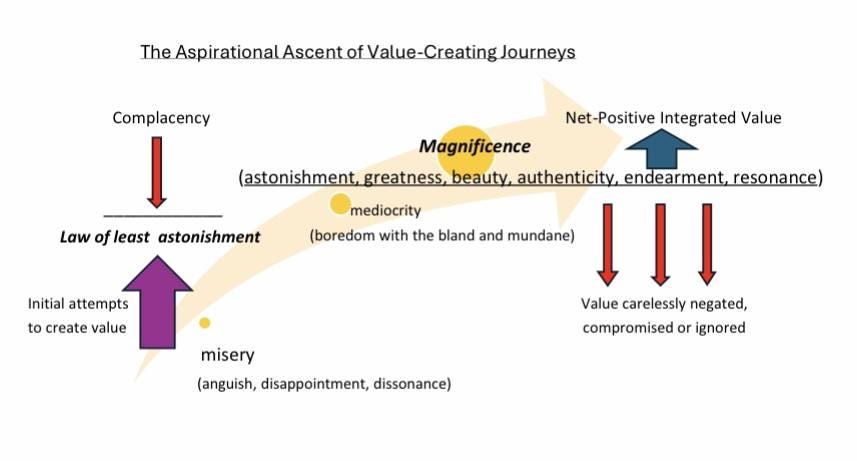These days it is not just the prevalence and proximity of perils (compounded by rampant uncertainty generated through politics) that is discomforting, but a passivity towards, and tardiness in, identifying, addressing, and overcoming the cascading nature of the challenges facing communities-as-destinations.
As written on our car`s sidemirrors: Objects are closer that they appear…though let`s not forget the blind-spots associated with geo-politics and tourism, its invisible burdens, and the shifting where of risks.
Identified by the Honorary Secretary-General of UNWTO, the perils that thrust the sustainability of communities-as-destinations into the spotlight and threaten the viability of destinations are ubiquitous. While it helps to have a framework for identifying the most pernicious, perils, though everywhere, can be differentiated from hazards.
As potential events or factors, perils can cause a loss, while hazards are factors or activities that may exacerbate a loss. Because perils and hazards tend to come packaged in economic terms, leaders and managers are quick to pay close attention to crisis, safety and hazard management and the associated need to manage risks (operational, executional, financial, reputational, natural catastrophes and disasters).
From organizational and community-minded points of view, however, we need to be reminded that disasters, perils and hazards affect triple bottom line performances (not just what is financial, but what is social and environmental) suggesting that there is a political nature to their destructiveness that demands governance, not simply management. In communities-as-destinations, governance recognizes the political nature of our lives, workplaces and leisure places, suggesting a distinct need for stewardship (endorsed by Destinations International) that demands deep accountability for all outcomes.
What if, then, the real elephant in the room is not simply the efficacy of crisis, safety, hazard or risk management policies, processes and practices, but the hazard of lax and ineffective leadership and management.
Problems that are epitomized by the following: Failures to proactively identify, address and resolve the most persistent of environmental, climatic, technological, political and human perils…tendencies to overpromise and underdeliver… tendencies to be involved in (or failure to punish) deceptive tactics such as greenwashing, irresponsible tourism, unethical business practices, or administrative evils…as well as tendencies to reward patriarchy over partnership, self-interest over service.
If leaders and managers fail to change their fundamental approach and beliefs about how to do their job in service to their organizations as well as to their communities and society-at-large, disillusionment, loss of trust and possible ruin are inevitable. Hence, the need to practice ethical tourism and mitigate risks, which states the obvious…but often fails to prevail.
Why? Rarely evident are the explanations for neglect, untimely or ineffective responses, and an unwillingness to be held accountable for loss or the collapse of organizational and tourism area lifecycles. Of course, it is in our nature to seek and savor stability. Everyone does their best work when operating environments are controllable and predictable; when relationships are stable; and the point of people`s efforts is readily apparent and purposeful. Too often, though, we are overwhelmed by the details of operations and functional responsibilities. We lack the will or the wealth to repair organizational cultures, the public places and natural environments we have wounded.
When change, particularly constant change, occurs, we flounder and double down on the need to exert control over others. Rather than leave room for engagement, partnership and empowerment, and reach out within our organizations and communities to share power and determine what people prefer in terms of response or action, there is a tendency to hoard power and decision-making.
The outside-in perils we face today have everyone on edge, they are exhausting and existential. We cannot help but be confused and uncertain as how to interpret, evaluate and deal with them. One thing is for sure, they cause and exacerbate political divisiveness (COVID), retaliation (Canada and Europe), and outright consternation. How we attempt to interpret and resolve these perils, however, is informed by the existence of internal convictions that form the backbone of any organization or community’s ability to weather storms and seize opportunities.
Unfortunately, these convictions and resulting inside-out actions can be ill-informed and based on:
· Inadequate or an inability to articulate, share and exchange a sense of purpose
· A lack of insight and intelligence gathering
· Belief in false assumptions
· Employees and citizens who feel disconnected and lack commitment
· Misunderstandings or ignorance about velocity and momentum
· Failures of long-standing partnerships
· Ineptness in making connections and managing complexity
· An inability to imagine failure, even prosperous futures
· Reliance on untrustworthy or unverifiable sources of information
· Inadequate maintenance of margins of safety
· Exclusive focus on the short-term
· Discomfort in taking the right risks
· Lack of operational discipline
· Toxic organizational cultures
· No effort to encourage distributed ownership and responsibility
· Lack of desire to adapt to shifting customer and market needs, requirements and expectations
· No responsibility for disruptions or adverse outcomes.
Each of these issues, in and of themselves, are disruptive. They can be corrected, must be corrected, if proven decision-making best practices are to prevail. But first, leaders, managers, owners, and board members must attain a profound understanding of the tourism industry, its vulnerability to outside forces - climate change, foreign ownership, control and influence - market dynamics, and consumer/citizenry behavior. Industry know-how is the linchpin to crafting and protecting offerings that resonate, but at a basic level requires an awareness of, and desire to adapt to the evolving roles of leaders that matters as much.
In this regard, there must be a deep comprehension of the financial intricacies within each sector to ensure prudent capitalization. Such knowledge should empower leaders and managers to make informed decisions, allocate resources effectively, anticipate the need for contingencies, anticipate and navigate financial challenges that could be disastrous, particularly when adversity strikes and resilience is required.
Leaders, managers, owners and board members, when armed with industry and worldly insights, are better prepared to craft strategies that reflect a nuanced understanding of economic, political, and adversarial forces. Insider knowledge is the compass that guides a more proactive organizational, community-wide and tourism cluster stance, enabling the ability to anticipate industry shifts and strategic positions for long-term success…but it is a knowledge and responsibility that must be shared…especially when employing climate transition impact frameworks, for example.
Strategy, it is often said, is about choosing what not to do. But when it comes to an organization or destination`s overall sustainability, especially when confronting multiple perils, that advice is often cast aside when too many issues are tackled at once…or when attempts are made to force change, Uxua`s tale. No matter what, scattered or mis-thought efforts that fail to generate either results or meaningful impact must be avoided.
Similarly, the tendency to focus too much on external pressures can cause leaders and managers to overreact to stakeholder demands (whose perceptions may be ill-informed) while underreacting to internal and employee or citizenry issues, or as the case could be, a reversal, whereby internal issues shut out external ones.
The way to resolve such dilemmas is to examine the issues from varying perspectives: What affects or creates value for organizations, tourism clusters and communities-as-destinations: what various stakeholders want: what the data and science tells us: and what we stand for as articulated through purpose and principles.
It all boils down to more effective decision-making and the management of decisions. Better decisions occur when they are broken down into smaller parts, particularly important when working hard to reflect a diversity of views (what people care about) and negotiating in ways that foster the conditions for crafting agreements whereby everyone perceives benefits and derives value… “allowing a hundred flowers to bloom”.
It is always a matter of building trust, sharing information, and utilizing our imagination. Our task, not just a hope, is to turn uncertainty into opportunity and remain true to our moral compass
Whereas some of us may remain melancholic through fire and rain, let it be said, We Will Survive! It always will remain an aspirational journey and a striving for magnificence.






